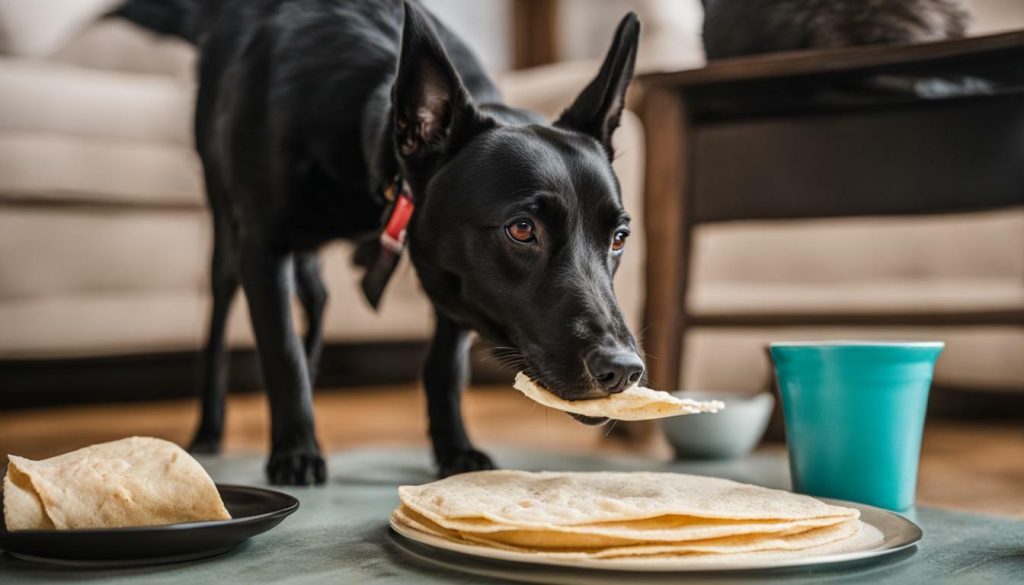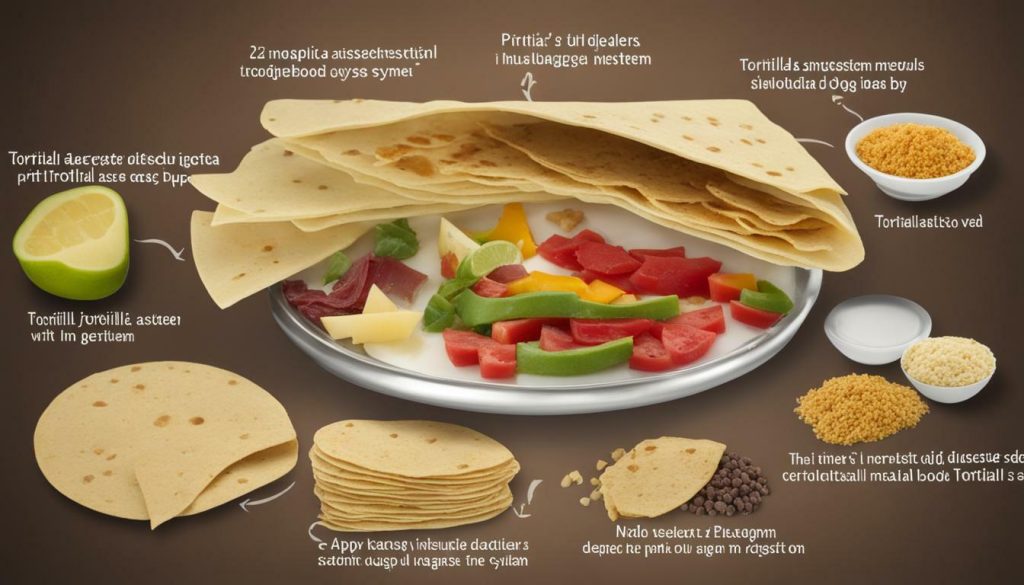 If you’re wondering whether it’s safe to feed your furry friend tortillas, you’ve come to the right place. As a responsible dog owner, it’s important to understand the potential benefits and risks associated with introducing tortillas into your dog’s diet. In this article, I will provide you with valuable information about canines and tortillas, including their nutritional value, safety concerns, and alternatives to consider. By the end, you’ll have a better understanding of whether tortillas should be a part of your dog’s diet.
If you’re wondering whether it’s safe to feed your furry friend tortillas, you’ve come to the right place. As a responsible dog owner, it’s important to understand the potential benefits and risks associated with introducing tortillas into your dog’s diet. In this article, I will provide you with valuable information about canines and tortillas, including their nutritional value, safety concerns, and alternatives to consider. By the end, you’ll have a better understanding of whether tortillas should be a part of your dog’s diet.
- Tortillas offer little to no nutritional value for dogs and can contribute to weight gain.
- Flour tortillas should be given in moderation due to their high fat and calorie content, as well as potential allergenic properties.
- Corn tortillas are a better option as they are generally lower in carbohydrates, calories, and fat.
- Tortilla chips should be avoided due to their high salt and fat content.
- Consulting a veterinarian is crucial before introducing any new food into your dog’s diet.
Understanding Canine Nutrition and Tortilla Safety
Before feeding your dog tortillas, it’s crucial to understand the importance of a balanced canine diet and the potential risks involved. While dogs can eat tortillas in moderation, they offer little to no nutritional value and can contribute to weight gain due to their high carbohydrate content. As responsible pet owners, it’s essential to prioritize our dogs’ dietary needs and provide them with a well-rounded meal plan.
When it comes to tortillas, there are a few factors to consider. Flour tortillas, for example, should be given in moderation. They tend to be high in fat and calories, which can lead to weight gain or other health issues. Additionally, dogs may have allergies or sensitivities to certain grains, making flour tortillas a potentially risky choice for their diet.
On the other hand, corn tortillas are generally a better option compared to flour tortillas. They are lower in carbohydrates, calories, and fat, providing a slightly healthier alternative. However, it’s important to note that tortillas, whether flour or corn, still offer minimal nutritional benefits to dogs. It’s always wise to consult with a veterinarian before introducing any new food into your furry friend’s diet to ensure it aligns with their specific nutritional needs and any potential health concerns.
| Tortilla Type | Nutritional Value | Risks |
|---|---|---|
| Flour Tortillas | High in fat and calories | Potential allergies or sensitivities |
| Corn Tortillas | Lower in carbohydrates, calories, and fat | Minimal nutritional benefits |
It’s also important to note that tortilla chips should be avoided when it comes to feeding dogs. These snack foods often contain high amounts of salt and fat, which can be harmful to our canine companions. Instead of tortilla chips, consider offering your dog healthier, dog-friendly treats.
Lastly, if you wish to offer your dog tortillas, homemade tortillas can be a safer option. By preparing them yourself, you have more control over the ingredients and can avoid potential allergens or additives. However, just like with any other treat, moderation is key. Even homemade tortillas should only be given in small quantities to avoid any unwanted health issues.
Remember, your dog’s diet should primarily consist of nutritionally balanced dog food that meets their specific needs. If you have any concerns or questions regarding your dog’s diet or the introduction of tortillas, it’s always best to consult with a veterinarian. They can provide expert advice tailored to your dog’s individual health requirements.
The Nutritional Value of Tortillas for Dogs
When it comes to tortillas, it’s important to note that they provide minimal nutritional benefits for our furry companions. While dogs can eat tortillas in moderation, they offer little to no nutritional value and can even contribute to weight gain due to their high carbohydrate content. Therefore, it’s crucial to prioritize a balanced diet for our dogs and ensure their nutritional needs are met through other means.
Flour tortillas, in particular, should be given in moderation to dogs. They tend to have a high fat and calorie content, which can lead to weight gain if consumed excessively. Additionally, some dogs may have allergies or sensitivities to certain grains found in flour tortillas. It’s always best to consult with a veterinarian before introducing any new food into a dog’s diet to avoid any potential adverse reactions.
On the other hand, corn tortillas are generally considered a better option for dogs. They are lower in carbohydrates, calories, and fat compared to their flour counterparts. However, it’s important to remember that even corn tortillas provide minimal nutritional benefits for dogs. While they may be a safer alternative, they should still be given in moderation and not relied upon as a significant source of nutrition.
| Tortilla Type | Nutritional Benefits |
|---|---|
| Flour Tortillas | High in fat and calories |
| Corn Tortillas | Lower in carbohydrates, calories, and fat |
When considering tortillas as a part of our dog’s diet, it’s important to be aware of the risks associated with certain types of tortilla products. Tortilla chips, for example, should be avoided as they are typically high in salt and fat, which can be harmful to a dog’s health. It’s always best to prioritize our dog’s dietary needs and consult a veterinarian for any concerns or questions.

“It’s always best to prioritize our dog’s dietary needs and consult a veterinarian for any concerns or questions.”
In conclusion, while dogs can eat tortillas in moderation, they do not offer significant nutritional benefits. It’s essential to prioritize a balanced diet for our dogs, consult with a veterinarian before introducing new foods, and ensure that their nutritional needs are met through appropriate sources.
Risks of Feeding Tortillas to Dogs
Feeding your dog tortillas can pose certain risks, including the possibility of allergies or sensitivities to the ingredients. While tortillas may seem harmless, they can contain common allergens such as wheat or corn, which can cause adverse reactions in some dogs. It’s important to be aware of these risks and monitor your dog’s response when introducing tortillas into their diet.
Allergies to tortillas can manifest in various ways, including itching, skin redness or irritation, gastrointestinal upset, or even respiratory issues. If you notice any of these symptoms after feeding your dog tortillas, it’s crucial to consult with a veterinarian to determine the cause and appropriate course of action. They may recommend eliminating tortillas from your dog’s diet or conducting further allergy testing to identify any other potential triggers.
In addition to allergies, tortillas can contribute to weight gain in dogs due to their high carbohydrate content. While it’s okay to offer tortillas as an occasional treat, it’s essential to do so in moderation. Excess consumption of tortillas can lead to obesity and related health issues in dogs, such as diabetes, joint problems, or heart disease. Prioritizing a balanced diet and consulting with a veterinarian can help ensure your dog’s overall health and well-being.

Remember, when it comes to feeding your dog tortillas, it’s important to consider their individual dietary needs and potential risks. While dogs can eat tortillas in moderation, they offer little to no nutritional value and should not replace a balanced diet. Always consult with a veterinarian before introducing any new food into your dog’s diet, especially if you suspect allergies or sensitivities. Your veterinarian can provide personalized guidance and help you make informed decisions regarding your dog’s nutrition.
Flour Tortillas: Proceed with Caution
While dogs can consume flour tortillas in moderation, it’s important to be aware of their high fat and calorie content and the potential for allergic reactions. Flour tortillas are a popular choice for humans, but they may not offer significant nutritional benefits for dogs. These tortillas are typically made with refined flour, which means they lack the fiber and nutrients found in whole grains.
Feeding dogs too many flour tortillas can lead to weight gain, especially if they are already prone to obesity. The high fat content in flour tortillas can also put a strain on a dog’s digestive system, potentially causing gastrointestinal upset.

If you choose to give your dog flour tortillas, it’s important to do so in moderation. Consider using smaller tortillas or tearing them into smaller pieces to control portion sizes. Additionally, be mindful of any signs of allergic reactions or sensitivities, such as itching, vomiting, or diarrhea. If you notice these symptoms, it’s best to avoid flour tortillas altogether and explore safer alternatives.
Tortilla Alternatives for Dogs
If you’re looking for healthier options to add some variety to your dog’s diet, there are alternatives to flour tortillas that may be more suitable. Some options include:
- Corn tortillas: Compared to flour tortillas, corn tortillas are lower in carbohydrates, calories, and fat. However, they still offer minimal nutritional benefits for dogs.
- Homemade tortillas: Making your own tortillas allows you to control the ingredients and ensure they are free from additives or preservatives. Just remember to moderate the portion sizes.
When introducing any new food into your dog’s diet, it’s crucial to consult with a veterinarian. They will be able to assess your dog’s specific dietary needs and provide guidance on suitable options. Remember, a balanced diet that meets your dog’s nutritional requirements should always be the priority.
In summary, while dogs can safely eat flour tortillas in moderation, it’s important to consider the high fat and calorie content, as well as potential allergic reactions. Explore alternatives like corn tortillas or homemade tortillas and consult a veterinarian to ensure your dog’s dietary needs are met.
Corn Tortillas: A Better Option?
If you’re considering including tortillas in your dog’s diet, corn tortillas may be a better option due to their lower carbohydrate, calorie, and fat content. While tortillas offer little to no nutritional value for dogs, corn tortillas tend to be a healthier choice compared to flour tortillas. They contain fewer carbohydrates, which can be beneficial for dogs who need to manage their weight or have specific dietary restrictions.
However, it’s important to remember that even corn tortillas should be given in moderation. Dogs have specific nutritional needs that should be met through a balanced diet consisting of high-quality dog food. Introducing tortillas as an occasional treat or addition to their meals should be done with caution and under the guidance of a veterinarian.

When feeding your dog corn tortillas, consider serving them plain without any added seasonings or toppings. It’s best to avoid using tortilla chips altogether, as they are typically high in salt and fat, which can be harmful to dogs.
Ultimately, the decision to include tortillas in your dog’s diet should be made in consultation with a veterinarian. They can assess your dog’s specific dietary needs and provide guidance on how to incorporate tortillas safely and in moderation. Remember, moderation is key when it comes to feeding any human food to dogs, and their overall health and well-being should always be the top priority.
Tread Lightly with Tortilla Chips
While tortilla chips may be tempting to share with your four-legged companion, it’s best to refrain from doing so due to their high salt and fat content. These snack foods are typically seasoned with salt and various spices, which can be harmful to dogs in large quantities. Excessive salt intake can lead to dehydration and electrolyte imbalances, while high-fat content can contribute to weight gain and digestive issues.
Additionally, tortilla chips are often fried in oil, which further increases their fat content. Dogs have sensitive digestive systems, and consuming oily and greasy foods can lead to gastrointestinal upset, including diarrhea and vomiting. It’s important to prioritize your dog’s health and well-being by providing them with a balanced and nutritious diet.
“Feeding your dog tortilla chips can put their health at risk due to the ingredients used in their preparation. The high salt and fat content can lead to various health issues, including dehydration, weight gain, and digestive problems.”
If you’re looking for alternative treats for your dog, consider options that are specifically formulated for canine consumption. Many pet stores offer a wide range of dog-friendly snacks made with natural ingredients and without added salt or harmful preservatives.
Table: Canine-Friendly Treat Alternatives
| Treat Option | Description |
|---|---|
| Carrot Sticks | Low-calorie and packed with vitamins, carrots make a crunchy and nutritious snack for dogs. |
| Apple Slices | Remove the seeds and core, then slice the apple into bite-sized pieces. Apples provide a good source of fiber and antioxidants. |
| Peanut Butter Drops | Choose natural peanut butter without added sugar or salt. Drop small amounts onto a baking sheet and freeze for a tasty, protein-rich treat. |
| Plain Rice Cakes | Low in calories and gentle on the stomach, rice cakes can be a satisfying and crunchy alternative. |
Remember, moderation is key when it comes to treating your dog. While these alternatives are generally safe, it’s important to consider your dog’s individual dietary needs and any specific health conditions they may have. It’s always a good idea to consult with your veterinarian before introducing any new foods or treats into your dog’s diet.

If you’re considering giving your dog tortillas, homemade ones may be a safer alternative, provided they are given in moderation. Dogs can eat tortillas, but it’s important to understand that they offer little to no nutritional value. Additionally, tortillas can contribute to weight gain due to their high carbohydrate content. When it comes to tortillas for dogs, moderation is key.
Flour tortillas, in particular, should be given sparingly due to their high fat and calorie content. They may also pose a risk of allergic reactions or cereal sensitivities in some dogs. While corn tortillas are generally lower in carbohydrates, calories, and fat, they still provide minimal nutritional benefits. It’s important to consult with a veterinarian before introducing any new food into your dog’s diet, including homemade tortillas.

When making homemade tortillas for your dog, it’s essential to prioritize their dietary needs. Remember that tortillas should not replace a balanced and nutritious diet. Instead, they should be viewed as an occasional treat or addition to their regular meals. It’s best to follow your veterinarian’s advice and recommendations to ensure your dog’s overall health and well-being.
| Tortilla Type | Portion Size | Frequency |
|---|---|---|
| Flour Tortillas | Small piece or 1/8 of a tortilla | Occasional treat |
| Corn Tortillas | Small piece or 1/8 of a tortilla | Occasional treat |
| Homemade Tortillas | Small piece or 1/8 of a tortilla | Occasional treat |
In conclusion, while dogs can eat tortillas, it’s important to approach the matter with caution. Homemade tortillas may be a safer option as long as they are given in moderation. Be mindful of your dog’s dietary needs and consult with a veterinarian to ensure their overall well-being. Remember, treats should never replace a balanced and nutritious diet. By providing tortillas as occasional treats, you can enjoy sharing a special moment with your furry friend without compromising their health.
Consult a Veterinarian
Before making any changes to your dog’s diet, it’s always best to consult with a veterinarian who can provide personalized guidance based on your dog’s specific needs. Our furry friends rely on us to make the best choices for their health and well-being, and that includes their dietary needs.
A veterinarian can assess your dog’s overall health, age, weight, and any existing medical conditions to determine if introducing tortillas into their diet is appropriate. They can also help you understand potential risks, such as allergies or sensitivities, that your dog may have to certain ingredients commonly found in tortillas.
Additionally, a vet can provide insight into the nutritional value, or lack thereof, that tortillas offer to dogs. While tortillas may be safe for occasional consumption, they should not replace a balanced and nutritious diet tailored to your dog’s specific needs. Consulting a veterinarian ensures that you are making informed decisions about what to feed your four-legged companion.
Taking a Proactive Approach to Canine Nutrition
- Always consult a veterinarian before introducing new foods to your dog’s diet.
- Ensure your dog’s diet is balanced and meets their nutritional requirements.
- Avoid feeding your dog foods that are high in salt, fat, or allergens.
- Monitor your dog’s weight and adjust their diet as necessary to prevent obesity.
- Offer treats and snacks in moderation, including tortillas.

| Food Item | Considerations |
|---|---|
| Flour tortillas | High in fat and calories, potential for allergies or sensitivities |
| Corn tortillas | Lower in carbohydrates, calories, and fat, but minimal nutritional value |
| Tortilla chips | High in salt and fat, not recommended for dogs |
| Homemade tortillas | May be a safer option, but should still be given in moderation |
Remember, your veterinarian is your best resource when it comes to ensuring your dog’s nutritional needs are met. They can help determine if tortillas can be included in your dog’s diet and provide guidance based on their individual needs. By taking a proactive approach to your dog’s nutrition and seeking professional advice, you can help keep your furry friend happy and healthy.
Canine Digestive System and Tortillas
Understanding how tortillas can impact a dog’s digestive system is important to ensure their overall well-being and prevent any potential issues. Dogs have a different digestive system compared to humans, and certain foods may not sit well with them. When it comes to tortillas, they can be quite heavy on a dog’s stomach due to their high carbohydrate content.
Tortillas, especially those made with flour, can be difficult for dogs to digest properly. The gluten in flour tortillas may cause digestive discomfort and result in gastrointestinal issues such as bloating, diarrhea, or constipation. Additionally, the high fat and calorie content in flour tortillas can contribute to weight gain and obesity in dogs if consumed in excess.
However, corn tortillas are generally easier for dogs to digest compared to flour tortillas. They are lower in carbohydrates, calories, and fat, making them a slightly better option. Nonetheless, it’s crucial to feed corn tortillas to dogs in moderation and consider their overall dietary needs.
| Tortilla Type | Carbohydrates | Calories | Fat |
|---|---|---|---|
| Flour Tortillas | High | High | High |
| Corn Tortillas | Lower | Lower | Lower |
In conclusion, while dogs can consume tortillas in moderation, it’s vital to consider their digestive system and nutritional needs. Flour tortillas should be given sparingly due to their high fat and calorie content, as well as the potential for allergies or sensitivities. Corn tortillas can be a better option, but they still offer limited nutritional value. It’s always best to consult with a veterinarian before introducing any new food into a dog’s diet to ensure their well-being and prevent any digestive issues.

When it comes to feeding tortillas to your furry friend, remember that moderation is key to maintain their overall health and well-being. While dogs can eat tortillas, they offer little to no nutritional value and can contribute to weight gain due to their high carbohydrate content. It’s important to prioritize your dog’s dietary needs and consult with a veterinarian before introducing any new food into their diet.
Flour tortillas should be given in moderation due to their high fat and calorie content. They can also pose a risk for allergic reactions or cereal sensitivities. Corn tortillas, on the other hand, are generally a better option as they are lower in carbohydrates, calories, and fat. However, it’s still important to remember that even corn tortillas provide minimal nutritional benefits for dogs.

Tortilla chips should be avoided when it comes to feeding dogs, as they are typically high in salt and fat. These can cause digestive issues and may even lead to obesity or other health problems. If you’d like to include tortillas in your dog’s diet, consider making homemade tortillas as a safer alternative. However, even with homemade tortillas, it’s crucial to provide them in moderation and ensure that they are only a small part of your dog’s overall balanced diet.
Tortilla Feeding Tips for Your Dog:
- Offer tortillas as an occasional treat, not as a staple food in their diet.
- Choose corn tortillas over flour tortillas due to their lower carbohydrate and fat content.
- Avoid giving your dog tortilla chips, as they are high in salt and fat.
- If you decide to make homemade tortillas, do so sparingly and always consult with a veterinarian first.
- Monitor your dog for any allergic reactions or digestive issues after introducing tortillas into their diet.
Remember, just like with any new food, it’s important to introduce tortillas gradually and monitor your dog’s response. If you have any concerns about your dog’s diet or overall health, always consult with a veterinarian for professional advice tailored to your furry friend’s specific needs.
Conclusion
In conclusion, dogs can eat tortillas in moderation, but it’s important to prioritize their dietary needs and consult with a veterinarian before making any changes to their diet. While tortillas are generally safe for dogs to consume, they offer little to no nutritional value and can contribute to weight gain due to their high carbohydrate content.
When it comes to flour tortillas, caution should be exercised due to their high fat and calorie content. Some dogs may also have allergies or sensitivities to cereals, which can pose additional risks. Corn tortillas, on the other hand, are generally a better option as they are lower in carbohydrates, calories, and fat. However, like flour tortillas, they provide minimal nutritional benefits.
Tortilla chips should be avoided when it comes to feeding dogs. These snacks are typically high in salt and fat, which can be detrimental to a dog’s health. It’s best to steer clear of tortilla chips altogether and opt for healthier alternatives.
Incorporating homemade tortillas into a dog’s diet can be a safer option, but they should still be given in moderation. Just like with any other food, it’s crucial to consider a dog’s dietary needs and consult with a veterinarian for personalized advice. A vet can provide guidance on portion sizes, potential allergies or sensitivities, and any other concerns specific to your dog.
FAQ
Can dogs safely eat tortillas?
Yes, dogs can safely eat tortillas in moderation.
Do tortillas offer any nutritional value to dogs?
Tortillas offer little to no nutritional value for dogs.
Are there any risks associated with feeding tortillas to dogs?
Yes, there are potential risks such as allergies and sensitivities.
Can dogs eat flour tortillas?
Dogs can eat flour tortillas in moderation, but caution is advised due to their high fat and calorie content and potential for allergic reactions.
Are corn tortillas a better option for dogs?
Corn tortillas are generally lower in carbohydrates, calories, and fat, making them a better option for dogs.
Should dogs be given tortilla chips?
No, tortilla chips are not recommended for dogs due to their high salt and fat content.
Can homemade tortillas be a safer alternative?
Homemade tortillas can be a safer option, but they should still be given in moderation.
Is it important to consult a veterinarian before feeding tortillas to dogs?
Yes, it is important to consult a veterinarian before introducing any new food into a dog’s diet.
How can tortillas affect a dog’s digestive system?
Tortillas may affect a dog’s digestive system, so precautions should be taken.
What is the key to feeding tortillas to dogs?
Feeding tortillas to dogs should be done in moderation to ensure a balanced diet.
Note: The FAQ section is not intended to provide a comprehensive list of all questions and answers related to dogs and tortillas, but rather to address some of the most frequently asked questions based on the content of the article.






